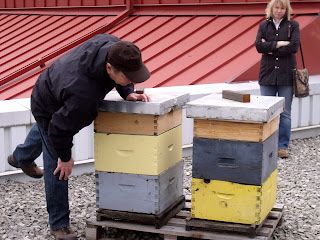The Jackman Humanities Institute Program for the Arts on Location/Dislocation and the Aboriginal Studies Program Presented a "Locating Compassion in Land Ethics" conference on March 23-25, 2012
(Dr. Jill Carter)
Over the course of the March 23-25, 2012 weekend, scholars, artists and activists from myriad disciplines within the GTA gathered to consider the history of Toronto (the Gathering Place). They were invited by conference organizer Dr. Jill Carter (Anishinaabe-Ashkenazi) to engage in discussion the original laws that governed Toronto, and to remember the connections and responsibilities contemporary Torontonians hold to the Indigenous Peoples who stewarded this land before contact. What follows below this blog post is a photo essay of the conference. Please enjoy, and I apologize for my lateness in posting this.
The first workshop of the day "Sweet Connections of Local Environmental Health and Honeybees" on March 24, 2012 was led by local beekeeper Brian Hamlin from 10am until 1pm. Brian Hamlin led participants through several areas of honeybee culture, ancient connections between man and bees, world food and bees, medicines from the bees, and current environmental challenges for bees, and were led to a rooftop apiary located on the U of T campus. Participants were given the opportunity to taste various types of honey and honey effusions.
(The Bee Keeper's Bible)
(Local Bee Keeper Brian Hamlin checking a rooftop apiary)
(Honeycomb Beeswax)
Following Brian Hamlin's workshop was a talk by William Woodworth Raweno:kwas (B.Arch., Ph.D.) Mohawk, Six Nations of the Grand River and Timothy Brian LeDuc, Ph.D. from the Faculty of Environmental Studies, York University titled "Recovering the Tribal Identity of Toronto: Ancestral Conversations." Woodworth and LeDuc spoke about how there is "a conscious amnesia of the deep cultural roots and history of the Toronto region" and it is this amnesia that plays a large part in the ambiguous and uncertain identity that continues to inform conversations around the city today.
(Presenters: Timothy Brian LeDuc and William Woodworth)
(Recovering Tribal Identity of Toronto)
Following the talk on "Recovering the Tribal Identity of Toronto was a workshop facilitated by Mimi Gellman, called "Reconnecting with Place: Mapping the Interior Landscape." Gellman, an Anishinaabe-Ashkenzi-Metis (Ojibway/Jewish/ Metis) is a conceptual artist, educator and Ph.D. candidate in the Cultural Studies program at Queens University. She is a practicing multi-disciplinary visual artist and curator and her current Ph.D. research is on the metaphysics of Indigenous mapping and how it investigates the relationship between Aboriginal cartographies, Indigenous aesthetics and senses of place.
(Mimi Gellman showing two participants what mapping looks like)
Sunday March 25, 2012
Panel One- Compassion and Scholarship in Thought and Deed
Panel One participants consisted of two U of T students, Jacob Nerenberg and Zexi Wang. Nerenberg and Wang discussed forms of alienation and dispossession upon which the University of Toronto is built. They spoke of how the University is thought of as an imperial institution, and traced the way these patterns of violence intersect in downtown Toronto, a site where foundational and ongoing colonial dispossession is multiplied locally and globally-in the form of marginalization of migrants, aggressive resource capital and manipulative governance.
Followed by this discussion was "Undergraduate Capacity Building and Experiences in Participatory Action Research: Process, Ethics and Methodology in Two Urban Aboriginal Diabetes Research Projects," led by Jessica Keeshig-Martin and Krystine Abel
Panel Discussion: Zexi Wang, Jacob Nerenberg, Brian Parisee, Jessica Keeshig-Martin and Krystine Abel)
Other topics included in the workshop included a student roundtable discussion where students Meghan Young and Sylvia Plain discussed their experiences in the Aboriginal studies program versus other experiences in other programs/courses they may have taken at the University of Toronto
(Students: Jennifer Seidel, Meghan Young, Sylvia Plain)
Lastly I would like to finish this photo essay blog post with two more photos that included a Lunch and Learn workshop that used Anishnaabe Symbol Based Reflection: An Indigenous Approach to Wholistic Research Methods (hosted by Jessica Keeshig-Martin and Krystine Abel, and a photo of the interim Director of the Centre for Aboriginal Initiatives, Dr. Deborah McGregor who spoke about "Anishnaabe Knowledge and Sustainability."
In the Anishnaabe Symbol Based Reflection, Keeshig-Martin and Abel explained that this concept was developed in 2005 by Dr. Lynn Lavallee and a group of research participants and used as a research process that asks participants to create art and symbols to represent the concept/question of the research project. In this workshop participants were asked to explore the question "How do you take care of yourself while conducting research."
(Meghan Young and Sylvia Plain with their Anishnaabe Symbol Based Reflection pieces)
On March 25, 2012, the conference closed with a keynote address by Professor Deborah McGregor on "Anishnaabe Knowledge and Sustainability." As an Anishnaabe woman, McGregor presented the view that "not only do Aboriginal peoples have knowledge around environmental science, but that such knowledge is also gendered." She explained this in relation to Anishnaabe responsibilities around water in Ontario, and spoke candidly about how Anishinaabe world views, philosophies, principles and values also form the foundation for Anishnaabe environmental science. She argued that "Environmental science from an Anishinaabe knowledge perspective focuses on the ethical conduct required to ensure appropriate relationships with all of Creation, and that proper relationships and conduct are required for all beings to ensure sustainability, not just for people but for all of Creation.
(Dr. Deborah McGregor)
Miiwe-That's all.











No comments:
Post a Comment